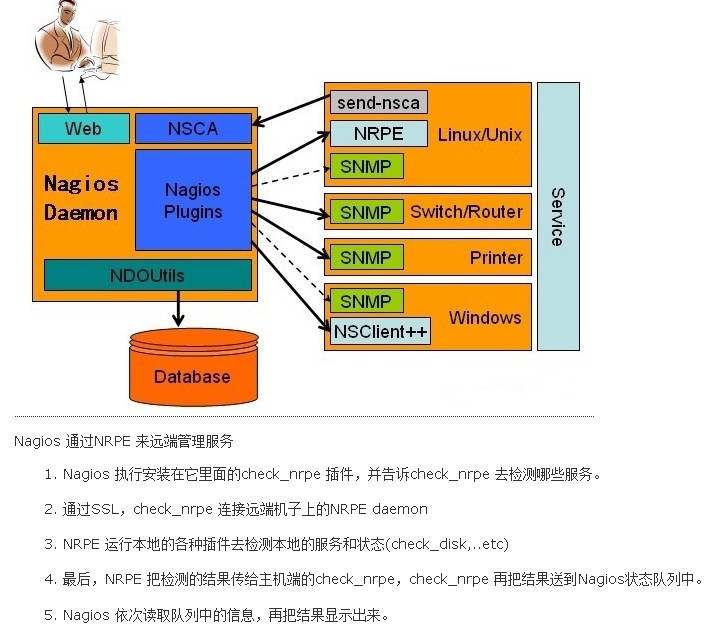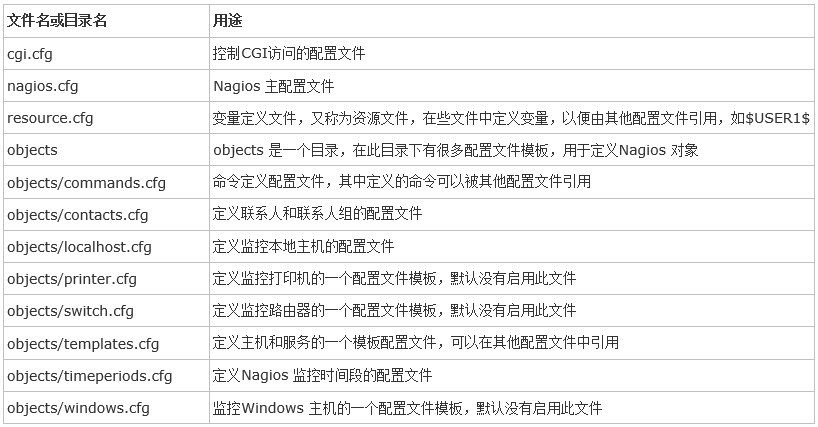Nagios安装配置及使用
1、工作原理图:

2、Nagios简述
Nagios是一款开源的免费网络监视工具,能有效监控Windows、Linux和Unix的主机状态,交换机路由器等网络设置,打印机等。在系统或服务状态异常时发出邮件或短信报警第一时间通知网站运维人员,在状态恢复后发出正常的邮件或短信通知。
Nagios主要监控服务/资源方面,适合多服务器上面的多服务监控,重点并不在图形化的监控,报警系统比cacti强大很多,nagios核心不做任何监控,所有监控都是由插件(脚本)来完成的。
Cacti是通过SNMP协议收集被监控服务器信息,而nagios有自己的agent收集信息(NRPE)。
3、Nagios插件说明
Nagios都是通过插件实现的,通常由一个主程序(nagios)、一个插件程序(nagios-plugins)
四个可选的附件(NRPE、NSCA工作客户端,NSclient 工作服务器和客户端、NDOUtils 工作服务端)
NRPE:监控linux/unix主机上执行脚本检测以实现对这些主机服务/资源的监控。
NSCA:让被监控的linux/unix主机主动将监控信息发送给nagios服务器。
NSClient++:用来监控windows主机时安装在windows主机上的组件(NSClient++ plugin)。
NDOUtils:将nagios的配置信息和事件产生的数据存入数据库,以实现这些数据的快速检索和处理,用于与Cacti整合。
Cacti与Nagios整合需要插件:
ndoutils下载:http://sourceforge.net/projects/nagios/files/ndoutils-2.x/ndoutils-2.0.0/ndoutils-2.0.0.tar.gz
npc下载:http://dl.cactifans.org/plugins/npc-2.0.4.tar.gz
4、Nagios插件下载
监控主机:
wget http://nchc.dl.sourceforge.net/project/nagios/nagios-3.x/nagios-3.4.4/nagios-3.4.4.tar.gz
wget http://nchc.dl.sourceforge.net/project/nagiosplug/nagiosplug/1.4.16/nagios-plugins-1.4.16.tar.gz
wget http://sourceforge.net/projects/nagios/files/nrpe-2.x/nrpe-2.14/nrpe-2.14.tar.gz
被监控 Linux 主机:
wget http://nchc.dl.sourceforge.net/project/nagiosplug/nagiosplug/1.4.16/nagios-plugins-1.4.16.tar.gz
wget http://sourceforge.net/projects/nagios/files/nrpe-2.x/nrpe-2.14/nrpe-2.14.tar.gz
被监控 Windows 主机:
http://nsclient.org/nscp/downloads
http://files.nsclient.org/0.3.x/NSClient%2B%2B-0.3.9-Win32.zip
http://files.nsclient.org/0.3.x/NSClient%2B%2B-0.3.9-x64.zip
一、安装apache和php
yum install -y httpd httpd-devel php php-gd php-devel php-mysql php-pdo php-mbstring php-snmp net-snmp-* perl-DBD-MySQL glibc glibc-common libjpeg libjpeg-devel libpng libpng-devel zlib zlib-devel gd gd-devel service httpd start chkconfig httpd on
二、安装nagios
groupadd nagcmd useradd -G nagcmd nagios usermod -a -G nagcmd apache tar zxvf nagios-3.4.1.tar.gz cd nagios ./configure --with-nagios-group=nagios --enable-event-broker #整合时间代理程序,默认安装/usr/local/nagios make all make install #安装主要的程序、CGI及HTML文件 make install-init #生成init启动脚本 make install-config #安装示例配置文件 make install-commandmode #设置相应的目录权限 make install-webconf #安装Apache配置文件,Nginx下不需要 chown nagios:nagios -R /usr/local/nagios/ /usr/local/nagios/bin/nagios -v /usr/local/nagios/etc/nagios.cfg #验证nagios配置文件 Service nagios start chkconfig nagios on
安装完成后,/usr/local/ngios下生成六个文件夹:
etc:Nagios配置文件位置
sbin:Nagios cgi文件所在目录,也就是执行外部命令所需文件所在的目录
Share:Nagios网页文件所在的目录
var:Nagios日志文件、spid 等文件所在的目录
var/archives:日志归档目录
var/rw:用来存放外部命令文件
创建nagiosweb登陆web页面用户和密码
htpasswd -c /usr/local/nagios/etc/htpasswd.users test New password: 123456
修改nagios默认登陆web页面用户
vi /usr/local/nagios/etc/objects/contacts.cfg contact_name nagiosadmin #把nagiosadmin修改为test
访问nagios页面:http://ip/nagios
三、安装nagios-plugins插件
tar zxvf nagios-plugins-1.4.16.tar.gz cd nagios-plugins-1.4.16 ./configure --with-nagios-user=nagios --with-nagios-group=nagios --with-mysql=/usr/local/mysql #添加监控mysql支持 make && make install
四、修改所有用户都有权限访问web页面
vi nagios/etc/cgi.cfg #默认授权的都是nagiosadmin,改为*所有用户 authorized_for_system_information=* authorized_for_configuration_information=* authorized_for_system_commands=* authorized_for_all_services=* authorized_for_all_hosts=* authorized_for_all_service_commands=* authorized_for_all_host_commands=*
五、cfg配置文件介绍

监控Linux主机
一、nagios监控端安装nrpe
tar zxvf nrpe-2.13.tar.gz #基于nrpe检测,所以必须也要安装 cd nrpe-2.13 ./configure --with-nrpe-user=nagios --with-nrpe-group=nagios --with-nagios-user=nagios --with-nagios-group=nagios make all make install-plugin
2、编辑 commands.cfg 文件定义 nrpe 对nagios使用
vi /usr/local/nagios/etc/objects/commands.cfg 末尾添加:
define command{
command_name check_nrpe #定义命令名称为check_nrpe,在services.cfg中要使用这个名称
command_line $USER1$/check_nrpe -H $HOSTADDRESS$ -c $ARG1$
} #这是定义实际运行的插件程序,-c后面带的$ARG1$参数是传给nrpe daemon执行的检测命令
3、配置加载监控对象文件:
vi /usr/local/nagios/etc/nagios.cfg 在 cfg_file=/usr/local/nagios/etc/objects/localhost.cfg 下添加: cfg_file=/usr/local/nagios/etc/objects/linux.cfg
4、设置要监控的内容:
vi /usr/local/nagios/etc/objects/linux.cfg
define host{
use linux-server
host_name squid.test.com
alias my squid #web页面显示的名字
address 192.168.0.202 #被监控主机ip
}
define service{
use generic-service
host_name squid.test.com
service_description check-swap
check_command check_nrpe!check_swap
}
define service{
use generic-service
host_name squid.test.com
service_description check-disk
check_command check_nrpe!check_disk
}
define service{
use generic-service
host_name squid.test.com
service_description check-ssh
check_command check_nrpe!check_ssh
}
define service{
use generic-service
host_name squid.test.com
service_description check-http
check_command check_nrpe!check_http
}
保存退出!
/usr/local/nagios/bin/nagios -v /usr/local/nagios/etc/nagios.cfg #验证nagios配置文件
service nagios restart
设置开机启动:
echo "/usr/local/nagios/bin/nrpe -c /usr/local/nagios/etc/nrpe.cfg -d" >> /etc/rc.local
二、Linux被监控端安装nagios-plugin和nrpe
1、安装nagios插件
useradd -s /sbin/nologin nagios tar -zxvf nagios-plugins-1.4.14.tar.gz cd nagios-plugins-1.4.14 ./configure --with-nagios-user=nagios --with-nagios-group=naigos make all && make install
2、安装nrpe
tar -zxvf nrpe-2.12.tar.gz cd nrpe-2.12 ./configure --with-nrpe-user=nagios --with-nrpe-group=nagios --with-nagios-user=nagios --with-nagios-group=nagios make all make install-plugin make install-daemon make install-daemon-config make install-xinetd #nrpe安装为xinetd服务
3、配置nrpe
vi /etc/xinetd.d/nrpe only_from = 127.0.0.1,192.168.0.204 #添加监控主机地址 vi /usr/local/nagios/etc/nrpe.cfg allowed_hosts=127.0.0.1,192.168.0.204 #允许监控主机对其监控 /usr/local/nagios/bin/nrpe -c /usr/local/nagios/etc/nrpe.cfg -d #启动nrpe netstat -tuplna | grep 5666 或 ps -elf |grep nrpe #查看是否启动 /usr/local/nagios/libexec/check_nrpe -H 192.168.0.203 #在监控端检测被监控端信息,显示版本则成功。 设置开机启动: echo "/usr/local/nagios/bin/nrpe -c /usr/local/nagios/etc/nrpe.cfg -d" >> /etc/rc.local
登陆web页面查看被监控主机信息!
4、nagios-web界面提示:
It appears as though you do not have permission to view information for any of the services you requested...
解决:vi /usr/local/nagios/etc/cgi.cfg
use_authentication=0 #默认1,设置为0
service nagios restart
监控Windows主机
一、nagios监控端配置
1、配置加载监控对象文件
vi /usr/local/nagios/etc/nagios.cfg cfg_file=/usr/local/nagios/etc/objects/windows.cfg #去掉注释
2、编辑 commands.cfg 文件定义check_nt对nagios使用(默认已经定义,不需要再配置)
define command{
command_name check_nt
command_line $USER1$/check_nt -H $HOSTADDRESS$ -p 12489 -v $ARG1$ $ARG2$
}
3、设置要监控的内容(默认配置)
vi /usr/local/nagios/etc/objects/windows.cfg
define host{
use windows-server
host_name winserver
alias My Windows Server
address 192.168.0.202 #被监控主机ip
}
define hostgroup{
hostgroup_name windows-servers
alias Windows Servers
}
define service{
use generic-service
host_name winserver
service_description NSClient++ Version
check_command check_nt!CLIENTVERSION
}
define service{
use generic-service
host_name winserver
service_description Uptime
check_command check_nt!UPTIME
}
define service{
use generic-service
host_name winserver
service_description CPU Load
check_command check_nt!CPULOAD!-l 5,80,90
}
define service{
use generic-service
host_name winserver
service_description Memory Usage
check_command check_nt!MEMUSE!-w 80 -c 90
}
define service{
use generic-service
host_name winserver
service_description C:\ Drive Space
check_command check_nt!USEDDISKSPACE!-l c -w 80 -c 90
}
define service{
use generic-service
host_name winserver
service_description W3SVC
check_command check_nt!SERVICESTATE!-d SHOWALL -l W3SVC
}
define service{
use generic-service
host_name winserver
service_description Explorer
check_command check_nt!PROCSTATE!-d SHOWALL -l Explorer.exe
}
二、Windows被监控端配置
NSClient++与 Nagios 服务器通信,使用的是Nagios 服务器的 check_nt 插件与nsclient连接

安装配置NSClient++
下载:http://nsclient.org/nscp/downloads,下面使用是不用安装的包,也可以使用安装包。
1、将NSClient++-0.3.9-Win32解压到C盘下NSClient++下
2、打开cmd切换到C盘NSClient++下,安装:"NSClient++.exe" /install,再"NSClient++.exe" SysTray
3、运行services.msc->右击属性NSClientpp->登陆->打钩允许服务与桌面交互
4、配置NSClient
打开nsc.ini去掉注释:CheckWMI.dll、RemoteConfiguration.dll和port=12489
allowed_hosts=127.0.0.1/32,192.168.0.204 #添加监控主机ip
5、启动NSClient++,进入NSClient++目录下,输入NSClient++ /start
6、监控端验证:/usr/local/nagios/libexec/check_nrpe -H 192.168.0.200
打开nagios web页面即可看到windows监控信息!